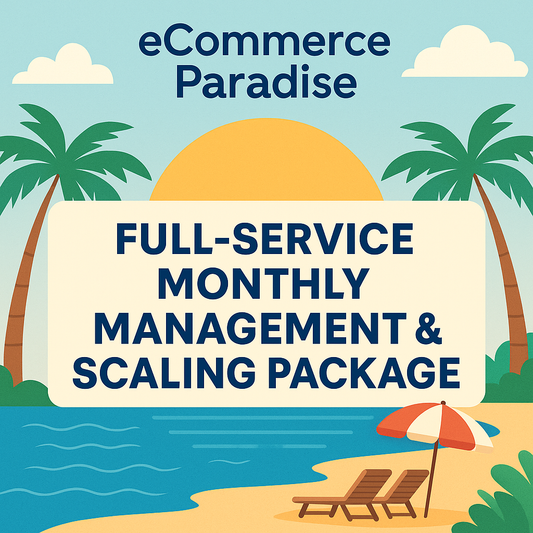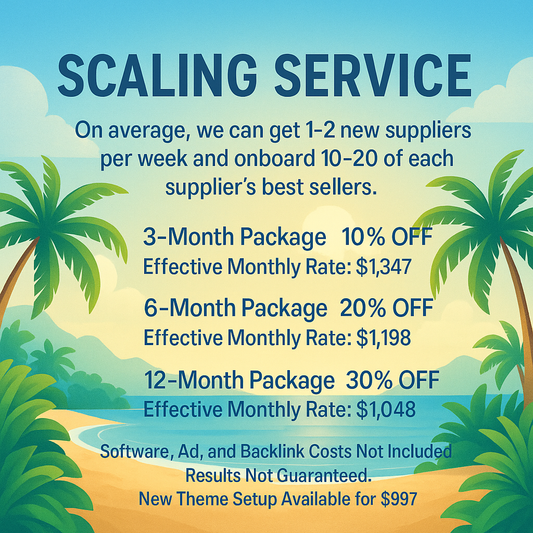
Legal Essentials for High Ticket Dropshipping Owners
Overview
Starting a high ticket dropshipping business requires understanding legal considerations to ensure compliance and protect your assets. Key areas include choosing the right business structure (sole proprietorship vs. LLC), obtaining necessary licenses and permits, managing tax obligations, protecting intellectual property, establishing clear supplier agreements, ensuring customer data protection, and considering insurance options. Engaging in proper legal practices from the beginning is crucial for building a successful and reputable brand.
Starting a high ticket dropshipping business can be an exciting journey that opens the doors to financial freedom and creativity. But before you dive in headfirst, it’s essential to understand the legal landscape that comes with high ticket ecommerce. Whether you're looking to establish a done for you dropshipping store or you’re exploring new high ticket niches, securing your business legally will save you time, money, and headaches down the road. In this post, I'm diving into the legal considerations every aspiring dropshipping entrepreneur should know!
Understanding Dropshipping: What Makes It Unique?
Before we delve into the legal aspects, it's important to grasp what dropshipping entails, particularly in high ticket ecommerce. Unlike traditional retail, dropshipping allows you to sell products without holding inventory. You simply partner with suppliers who handle storage and shipping. This model is especially lucrative in high ticket niches as it focuses on higher-value items, maximizing profit margins.
High Ticket Dropshipping Benefits
- Reduced Risk: With no necessity for holding inventory, you minimize financial losses dramatically.
- Scalability: It’s easier to scale a high ticket dropshipping business since you don't have to worry about overflowing stock or warehouse space.
- Flexibility: You can run your dropshipping business from anywhere, as long as you have an internet connection.
Navigating the Legal Landscape of Your Dropshipping Business
As with any business, understanding the legal requirements of a high ticket dropshipping service ensures that you remain compliant with local regulations and international laws. Here are the key elements to pay attention to.
Business Structure: Sole Proprietorship vs. LLC
Deciding on your business structure is one of the first legal considerations when starting a dropshipping high ticket business. The most common options are a sole proprietorship and a Limited Liability Company (LLC).
- Sole Proprietorship: This is the simplest form of business, where you’re personally liable for business debts. This setup can expose personal assets in case of legal disputes.
- LLC: Forming an LLC separates your personal and business assets. It protects your personal property from business liabilities, making it a preferred option for many high ticket dropshipping entrepreneurs.
Business Licensing and Permits
In many jurisdictions, running a retail business, including a dropshipping business, requires permits and licenses. The specific requirements may vary depending on your location and the nature of your products. Common licenses include:
- Sales Tax Permit
- Business License
- Home Occupation Permit (if operating from home)
It's crucial to check local regulations to avoid potential fines or legal repercussions. Consulting a legal professional who understands e-commerce can help clarify your obligations.
Tax Obligations in Dropshipping
Taxation is another critical area for high ticket ecommerce stores. Different regions have various tax regulations, especially when it comes to sales tax for online sales. Understanding your tax responsibilities is crucial to ensuring your business remains compliant.
Sales Tax Collection
In the United States, sales tax laws can be complex. Depending on where your business is registered and where your customers are located, you may have to collect sales tax on sales. Many dropshipping high ticket entrepreneurs use platforms like Shopify done for you to streamline sales tax management, as these platforms can automate many aspects of compliance.
Income Tax Implications
As a business owner, you will need to report your income to the IRS and file business taxes. The income generated from your dropshipping done for you ecommerce business must be reported accurately, irrespective of your business structure. Consulting an accountant familiar with e-commerce can help you navigate these responsibilities effectively.
Intellectual Property Rights
When dealing with high ticket dropshipping, it’s important to be aware of intellectual property laws. Protecting your brand and avoiding infringement on others' rights is paramount.
Trademark Protection
Trademarking your brand name and logo can help safeguard your identity in the market. It prevents others from using similar marks that could confuse consumers. This is especially important in the high ticket niches where branding plays a significant role in purchasing decisions.

Copyright Considerations
If you’re creating original content for your done for you dropshipping website, you’ll want to ensure those materials are protected under copyright law. This includes anything from product descriptions to blog posts and promotional materials. Original content can help improve your SEO rankings while also protecting your brand identity.
Supplier Agreements and Contracts
Your relationship with suppliers is crucial, especially when you're running a turnkey dropshipping store. Having solid agreements in place can protect your business and clarify expectations.
Importance of Clear Contracts
Every high ticket dropshipping service should have a clear contract with suppliers. This agreement should outline:
- Payment Terms
- Shipping Responsibilities
- Returns and Refunds Policies
- Quality Control Standards
These provisions will not only help in maintaining good relationships with your suppliers but will also shield you from potential legal disputes. Always read contracts carefully or consult a legal professional before signing to ensure you understand your obligations.
Customer Privacy and Data Protection
With the rise of online shopping, customer data protection is more important than ever. As a high ticket dropshipping entrepreneur, ensuring your customers' data is secure is not just ethical but also legally mandated in many regions.
Understanding Data Protection Laws
Familiarize yourself with regulations like the General Data Protection Regulation (GDPR) if you're selling to customers in the European Union. This law requires businesses to implement strict data protection measures. Also, look into the California Consumer Privacy Act (CCPA) if you're targeting customers in California. Compliance with these regulations is critical to maintaining trust with your customer base.
Implementing Strong Data Security Measures
Securing customer data isn't just about compliance; it also impacts your brand's reputation. Use secure payment gateways, encrypt sensitive information, and ensure that your done for you dropshipping website has updated security measures in place.
Insurance for High Ticket Dropshipping Businesses
Protecting your assets is crucial, and having the right insurance can safeguard you from unexpected challenges. As a dropshipping entrepreneur, you might want to consider the following insurance types:
General Liability Insurance
This insurance covers claims related to bodily injuries and property damage occurring as part of your business operations. It's essential to protect yourself in case of accidents or mishaps.
Product Liability Insurance
Even though you're not directly manufacturing products, product liability insurance can protect you from claims if a product causes harm. This coverage is especially important in high ticket niches where the stakes are higher.
Embarking on Your Dropshipping Venture
The road ahead is filled with opportunities! As you gear up to launch your high ticket dropshipping business, keep these legal considerations in mind. Engaging in proper business practices from the start will set you up for success, reduce risks, and pave the way for a sustainable, thriving business. Don't shy away from seeking legal advice when needed, and prioritize compliance above all.
Ultimately, remember that the success of your dropshipping business isn't just about the products you sell. It's about building a reputable and compliant brand that earns the trust of your customers in the high ticket ecommerce world. Whether leveraging done for you ecommerce solutions or focusing on your own dropshipping strategy, your legal foundation will be one of the most valuable investments you make. So, start strong and enjoy the journey ahead!
Linked Product

Turnkey Done-For-You Business-In-A-Box High-Ticket Dropshipping Ecommerce Shopify Store Complete Build & Launch Service
The Turnkey Done-For-You Business-In-A-Box service offers a comprehensive solution for launching a high-ticket dropshipping Shopify store without the typical learning curve. With expert assistance in niche research, store setup, and marketing strategies, users can quickly transition from concept to operational business. This service is particularly beneficial for those looking to enter the ecommerce space efficiently and effectively, with support throughout the entire process.
View Product

















